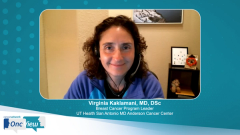
HER2+ Breast Cancer Clinical Pearls
Advice for community physicians treating HER2+ breast cancer.
Matthew Fowler: What are some of the questions that patients with HER2-positive breast cancer typically have when they’re discussing treatment and managing their disease?
Virginia Kaklamani, MD, DSc: One of the questions is, what are the potential adverse reactions from the treatments? Different treatments have very different adverse reactions. The second question is going to be, what’s the chance of a response, what’s the duration of response? And then, “What are my other options?” Those are the big questions that they have. When we look at adverse reactions, trastuzumab deruxtecan will have some hematologic toxicities. It can decrease white blood cell count and red blood cell count; it can cause some diarrhea. A big concern can be the rate of interstitial lung disease [ILD] that we have with this agent, but based on the most recent data, the rate of ILD is not as high as we thought it was. With tucatinib, it’s an oral agent, and one of the issues is that most of these oral tyrosine kinase inhibitors is diarrhea. Tucatinib is much milder in the GI [gastrointestinal system] compared to other tyrosine kinase inhibitors, so it’s pretty well tolerated. Margetuximab by itself seems to be probably the best-tolerated option, but we always combine it with chemotherapy, so then we have to deal with the chemotherapy-related adverse effects. Finally, with neratinib, one of the bigger concerns with diarrhea, and in the past few years we’ve learned how to give the agent to try to minimize the diarrhea that patients experience.
Matthew Fowler: With these questions that patients have, do you have any go-to data or guidelines that you can provide them to help answer those questions?
Virginia Kaklamani, MD, DSc: The guidelines we use the most are either the NCCN [National Comprehensive Cancer Network] or the ASCO [American Society of Clinical Oncology] guidelines. Those are the closest guidelines to being as objective as possible but also being inclusive, which is important in medical oncology. As far as data, they come from the individual clinical trials. We don’t have a lot of real-world data with HER2-positive disease, but the clinical trials are well representative of what we see in the clinic in our patients.
Matthew Fowler: To sum things up, what are some clinical pearls that you can share with our audience about treating patients with HER2-positive early-stage breast cancer?
Virginia Kaklamani, MD, DSc: In the early-stage setting, it’s important for us to recognize that the majority of these patients are going to be cured of their disease, and so we have to have optimization of treatment. We should not overtreat patients, but we should not undertreat patients either. It’s important to recognize what the risk of recurrence is to the best of our ability, and we still have a lot of progress to make, and then choose the right chemotherapy and the right anti-HER2 therapy so that we can cure that individual. In some cases, the patient unfortunately is going to have to deal with increased toxicity because the goal is cure. But again, it’s important because once the patient metastasizes, that’s a totally different animal, which we would rather be avoiding. In the metastatic setting, it’s important to have a balance of quality of life but also overall survival. It’s the art of medicine to be able to achieve both for the same patient.
Matthew Fowler: That’s all we had for you, Dr Kaklamani. Thank you so much for your time.
Virginia Kaklamani, MD, DSc: Thank you so much, Matthew, I appreciate it.
Matthew Fowler: Thank you all for watching this contemporary CancerNetwork® OncView™ program. We hope that you found this to be valuable to your clinical practice.
Transcript edited for clarity.
Newsletter
Stay up to date on recent advances in the multidisciplinary approach to cancer.






































